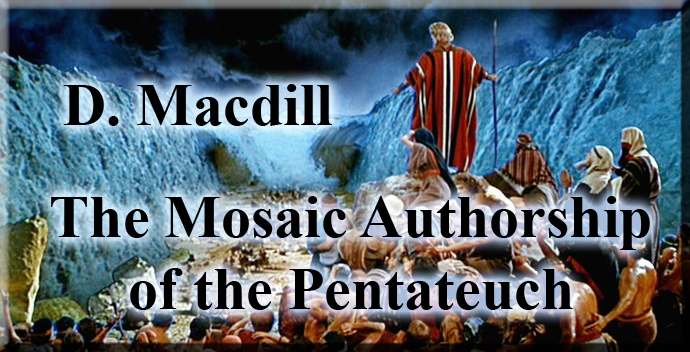
The Mosaic Authorship of the Pentateuch
By D. Macdill
Part III - Internal Evidence
Chapter 11
|
EGYPTIAN WORDS AND NAMES The author's ignorance of the Egyptian language and hieroglyphics disqualifies him for a proper handling of this subject. All that shall be attempted is the statement of a few facts. 1. The name Pharaoh is the Hebrew title of the Egyptian king. It is Hebrew in this sense, that it is employed by the Hebrew writers and by them alone. It occurs first in the history of Abraham. But Pharaoh is an Egyptian word (Perao), and means the great house, or palace. The Sublime Porte of the Turks is an analogous phrase. 2. The word abrech (translated "bow the knee''1) is declared to be of Semitic origin, but is retained in the hieroglyphic dictionary.2 3. Zaphnath-paaneah,3 the title given to Joseph, means governor of the place of life; i. e., of the capital of the country. 4. Asenath, the name of Joseph's wife, is declared to be pure Egyptian, and to be but seldom met with, except in the Old and Middle Empire. 5. Poti-pherah, the name of Joseph's father-in-law, means gift of the sun. 6. Ahu, translated "meadow" in Genesis 41:2, is an Egyptian word, which means marsh-grass or sedge. It is translated "reed-grass" in the Revised Version. 7. The name Moses appears to be of Egyptian origin. It appears in Rameses, Amosis, and other names. It contains the Egyptian word for son — mes or mesu, Pharaoh's daughter called the child found in the ark of bulrushes "Moses," claiming him as her son, because she had drawn him from the water and thus given him birth. 8. Rameses or Ramesu means the son of the sun.4 This list is sufficient to remind the reader that Genesis and Exodus contain Egyptian words and names. Their use suggests the residence of the author in Egypt, just as the Aramaic words in the books of Daniel and Ezra suggest the residence of their authors in Babylonia. As the Aramaic words in these books point to the time of the exile, so the Egyptian words in the Pentateuch point to the time of the exodus. The occurrence of such words in Genesis and Exodus is accounted for only in this way.
|
|
 |
 |
|
1) Gen. 41:43. 2) Brugsch-Bey, Egypt Under the Pharaohs, p. 122. 3) Gen. 41:45. 4) These facts are taken from Brugsch-Bey, Kenrick, Sayce, and Naville.
|
|
-
Site Navigation
 Home
Home What's New
What's New Bible
Bible Photos
Photos Hiking
Hiking E-Books
E-Books Genealogy
Genealogy Profile
Free Plug-ins You May Need
Profile
Free Plug-ins You May Need
 Get Java
Get Java.png) Get Flash
Get Flash Get 7-Zip
Get 7-Zip Get Acrobat Reader
Get Acrobat Reader Get TheWORD
Get TheWORD